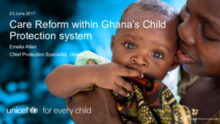Displaying 311 - 320 of 608
This presentation provides an overview of child protection issues and care reform in Ghana.
The study explored the health challenges faced by orphans living with extended families in South Africa.
This article describes a research study investigating child safety in biological and non-biological kinship care placements.
‘Monique's early childhood was the sort of experience that might have broken most kids. Now 19, she found a loving home with a relative when she was nine.
This study from the Special Issue on Kinship Care of the Child Welfare Journal examined the impact of a kinship supports intervention implemented in 16 children services agencies in the US.
University at Albany, New York State Kinship Navigator, and the Child Welfare League of America (CWLA) formed a collaborative partnership to plan and host a Kinship Care Summit in Albany, New York in September 2016. The Summit included presentations by authors of kinship manuscripts that were accepted for this Special Issue on Kinship Care of the Child Welfare Journal.
This special issue focuses on the much larger number of kinship caregivers, who either intervene on their own or accept the assistance of child protective authorities that facilitate informal arrangements without taking legal custody.
In this empirical analysis of kinship caregivers and children from the Special Issue on Kinship Care of the Child Welfare Journal, researchers sought to determine the protective factors that mediate against risks and produce optimal levels of child well-being for children being cared for by kinship caregivers in the US.
This article from the Special Issue on Kinship Care of the Child Welfare Journal explores the Family Connections Discretionary Grant Program in the US.
The purpose of this introduction of the Special Issue on Kinship Care of the Child Welfare Journal is to offer a conceptual framework for addressing the challenges involved in developing a coherent set of policies and practices with respect to kinship care in the US.

